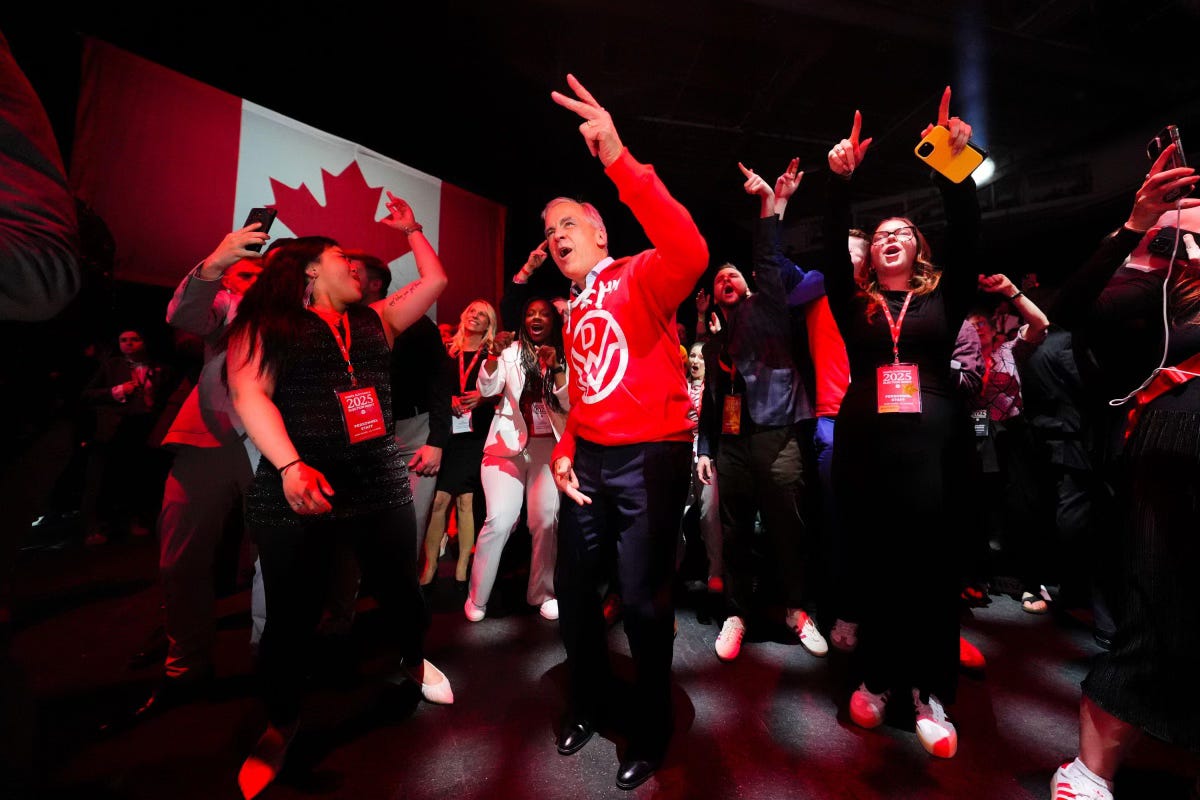
For the second time in as many months, I open my musings with “Poor Canada”. The first time of course was when the Liberal Party elected itself Mark Carney as leader and in consequence as Prime Minister. Political parties, steeped as they are in tribalism have an uncanny ability to make some very odd choices when it comes to selecting their leaders – the British Conservative and Labour parties both have a song or two to sing on that front – so from that perspective I have no gripe with the Canadian Liberals. I simply wouldn’t have done it but, with the country trembling under the assault on its sovereignty and economy launched on 21 January by the newly inaugurated POTUS, political rationality went out the door.
Carney stepped out of the shadows as decade-long Liberal PM Justin Trudeau finally fell, making all the necessary noises and spiritually whistling his version of Gloria Gaynor’s great hit “I will survive”. From being dead and buried in January, the Liberals, armed with Carney’s fighting talk, have staged a staggering revival.
Carney was not even an MP, had never sat for a single day in the nation’s parliament and had to boot not even lived in the country since he departed for the job at the Bank of England in 2013. Carney was a central banker, and in my book not even a particularly good one, but that is a job in which one is helped by being able to talk a lot and say little and by knowing that timing is everything. I can’t think of many central bankers, good or bad, who have displayed such avowed political ambition. Sure, the ECB’s Mario Draghi – St Mario – served briefly as Italy’s Prime Minister but that was in response to the plaintive cry for a technocrat to help stabilise the nation’s finances and, let’s be frank, his tenure was not exactly a howling success.
The Canadian dollar is not impressed, albeit less likely because it dislikes Carney than its distaste for political uncertainty. Anyone care to open a book on when new elections become necessary?
Stage presence can only get you so far – think Boris – and at the end of the day it takes more to run a country. To be fair, we speak often of the complexities of 21st century supply chains. Note the piece in yesterday’s FT tilted “Why Trump can’t build iPhones in the US”. Amongst other it reports that there are 2,700 different parts in an iPhone, sourced from 187 suppliers in 28 countries. Standing up and demanding that manufacturing be repatriated is easy, doing it is beyond impossible, one of the conclusions being that even if they did try to bring it home to the US, the unit cost to the consumer would likely rise to close to US$ 3,500. If making a phone is that complicated, how easy do you think it is to run a modern country and especially if you have, as has Carney, not a shred of government experience?
I refer back to Trump 1.0. He got to the White House in 2016 with the same ideas as he has now albeit without the knowledge of how to get them implemented. Do you recall the revolving door? Have you noticed how stable his current cabinet is? You may or may not like what you see and hear but you must credit him that he learnt a lot about government and those lessons are now being put to work.
I question – and this has nothing to do with the Canadian elections – whether managing a country has of itself become too complex, too multi-layered and multi-faceted for human beings, even the brightest and best, to be able to get their heads around. Not that the brightest and best ever even want to get involved in running countries; they are too smart not to know that it can’t be done. Electoral democracy lives on slogans and simplification. Rachel Reeves, that famous ex-Bank of England economist, became Britain’s Chancellor of the Exchequer chanting “Growth, growth, growth” but when finally assuming office it transpired that she in reality had no clue of where it was supposed to come from. She arrived not knowing what she wanted to do nor how she was going to do it. Slogans can get you elected but they can’t run a country. Pardon the fatuousness of the question but might AI be destined to deliver the administrative solutions to political problems? Answers on a postcard.
Poor Canada. Not only has it got Carney as leader of the largest party in Parliament, but he is there with a minority. In other years and in other circumstances, his electoral victory would be painted as a defeat for just a week ago he was looking to be cruising to a comfortable majority. What’s that lovely line: “The people have spoken but we don’t quite know what they’re telling us”. With 172 seats needed for a majority, the Liberals look to have gained 161 as opposed to the Conservatives’ 150. The Liberals will be short of reliable coalition partners – the PQ, the Parti Québequois, would not be first choice – so the long-term survival chances of a new Carney-led Liberal government are slim.
A government of national unity in the face of Donald Trump’s call for Canada to become the 51st state of the Union? Until the US Army starts massing along the 5,525 mile border and the Donald begins to speak of a special military operation, I think not.
